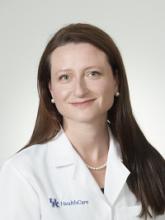5 questions about age-related macular degeneration


Written by Dr. Claire Fraser, an ophthalmologist at UK Advanced Eye Care. Dr. Fraser specializes in treating macular degeneration, an eye disease that can cause vision loss. Here, she addresses five of the most frequently asked questions about age-related macular degeneration.
Age-related macular degeneration (AMD) is very common in the United States and in Kentucky. It is one of the leading causes of vision loss in people over the age of 50.
What kind of vision loss is experienced in AMD?
In general, AMD affects central vision and tasks such as reading, writing and driving. Patients with AMD may notice blurred central vision, blind spots and distorted vision with straight lines appearing wavy or crooked. Early AMD may have no symptoms.
Are you at risk for developing AMD?
Risk factors include:
- Age over 60 (but it can occur sooner).
- Smoking, which increases risk of the disease and rate of progression.
- Race. AMD is more common in Caucasians.
- Nutrition. A diet that is high in fat and cholesterol can increase the risk of AMD.
- Family history. Having a family member with a history of AMD increases your risk.
What is the difference between dry and wet AMD?
Dry AMD is most common and is usually milder than wet AMD. Visual changes in dry AMD are caused by changes in the retinal pigment epithelium under the retina. Dry AMD can progress to wet AMD. Wet AMD is less common and usually has more severe and rapid vision loss. Loss of vision in wet AMD is caused by abnormal blood vessels developing under the retina that can bleed or leak fluid.
What can be done to reduce the risk of developing AMD or slow the progression of the disease?
- Avoid smoking.
- Exercise regularly.
- Maintain normal blood pressure and cholesterol levels.
- Eat a diet rich in green, leafy vegetables and fish.
Can AMD be treated?
- Vitamin supplementation using the Age-Related Eye Disease (AREDS 2) formula may reduce the risk of progression from dry AMD to wet AMD by up to 25 percent in some patients.
- Wet AMD treatments include medications such as Avastin, Lucentis and Eylea, which may reduce abnormal blood vessel growth and leakage. These medications are administered directly to the eye, and may result in some visual recovery.
If you are at risk or suspect you have symptoms of AMD, it is important to see an eye specialist for evaluation including a dilated eye exam and any additional indicated testing.
UK Ophthalmology, now known as UK Advanced Eye Care, is moving! Beginning March 20, all appointments will be located in leased space within the new Shriners Medical Center for Children building, just across South Limestone from UK Albert B. Chandler Hospital. This new space is not only beautiful, it’s state-of-the-art and will allow us to better serve our patients. We hope you’re as excited as we are.





